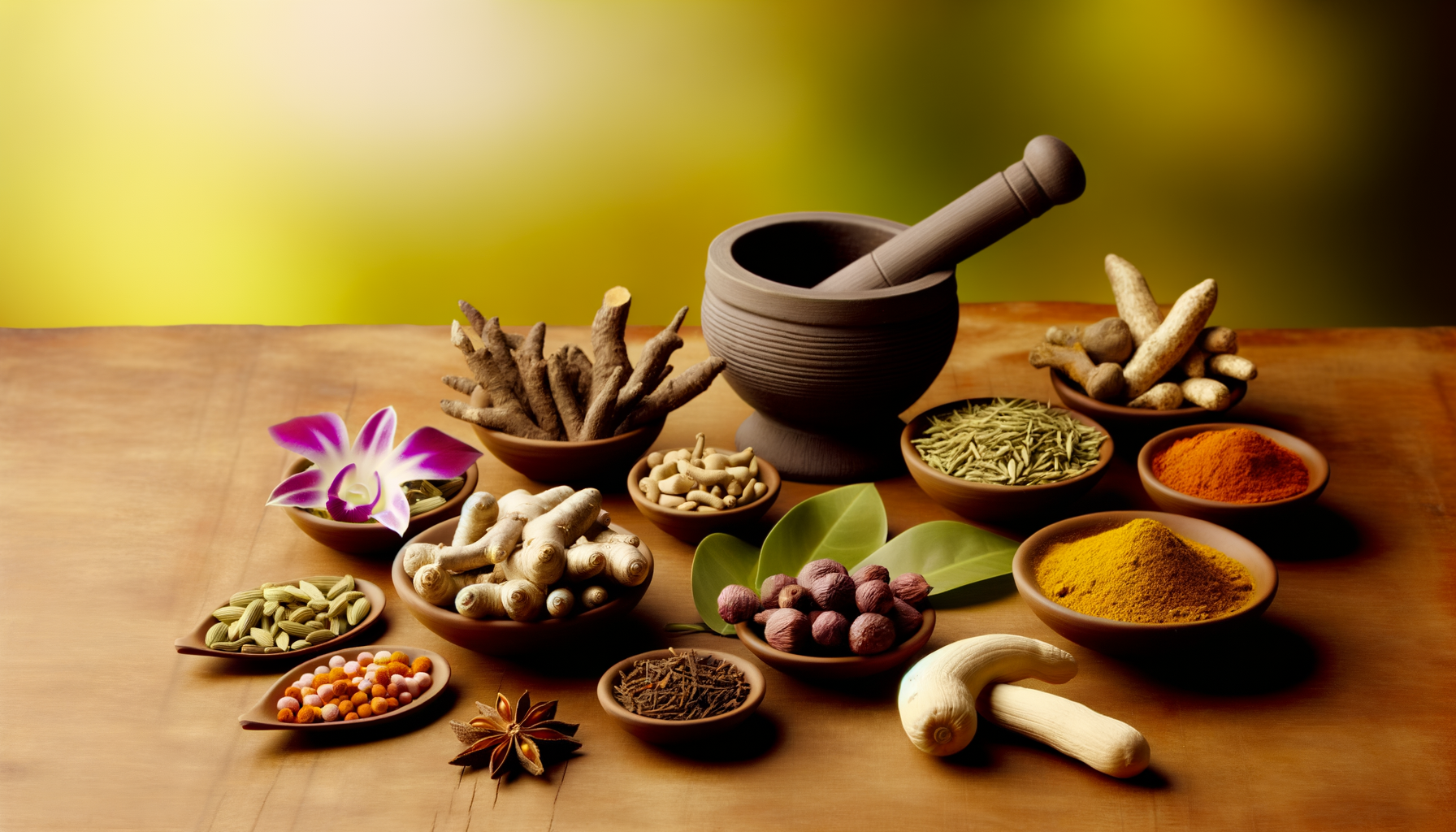Overview of Ayurvedic Medicine
Ayurveda, a traditional Indian system of medicine, has been a cornerstone of holistic health and wellness for over three millennia. Derived from the Sanskrit words ayur (life) and veda (knowledge), Ayurveda translates to the ‘knowledge of life’. This ancient practice emphasizes the balance between the body, mind, spirit, and environment, and is rooted in the belief that disease results from imbalances within an individual’s consciousness. Ayurvedic medicine encompasses a variety of treatments including internal purification, specialized diets, herbal remedies, massage therapy, yoga, and meditation, all aimed at restoring harmony and promoting longevity.
The Role of Herbs and Spices in Ayurveda
Herbs and spices play a pivotal role in Ayurvedic medicine, serving not only as culinary delights but also as potent medicinal agents. These natural elements are integral to the practice’s pharmacopeia, with each substance offering unique health benefits. From the stress-relieving properties of Ashwagandha to the anti-inflammatory prowess of Turmeric, Ayurvedic herbs and spices are utilized for their therapeutic effects, which include detoxification, symptom reduction, and bolstering the body’s resistance to disease.
The Interplay of Diet, Exercise, and Lifestyle
The holistic nature of Ayurveda extends beyond treatments and remedies to encompass diet, exercise, and lifestyle as key components of overall health. A balanced diet tailored to an individual’s constitution (prakriti) and life forces (doshas) is considered essential for maintaining health and preventing illness. Regular exercise, particularly yoga, supports physical strength and mental clarity, while lifestyle practices such as meditation contribute to emotional well-being and stress management. Together, these elements form a comprehensive approach to health that is the hallmark of Ayurvedic medicine.
In conclusion, Ayurveda’s holistic approach to health and wellness offers a rich, integrative path to well-being, emphasizing natural therapies and a balanced lifestyle. As this ancient practice gains global recognition, it continues to be a source of inspiration for those seeking a harmonious and natural way to health and longevity.
By the way, something for you, a little gift!!!
I am just in the middle of publishing my book. It’s about How women can balance their hormones. One part is about food and diet, of course.
Follow this link and enter your email.
I will send you this part of the book for free once the book is published. It has many concrete, practical tips and recipes and will help you feel better during menopause or times of Big hormonal fluctuations.
Annette, Damiva Lead for Health & Wellness

Ashwagandha: The Stress-Relieving Powerhouse
Adaptogenic Properties and Stress Management
Ashwagandha, scientifically known as Withania somnifera, is a revered herb in Ayurvedic medicine, often touted for its adaptogenic properties. Adaptogens are natural substances believed to help the body adapt to stress and exert a normalizing effect upon bodily processes. Ashwagandha, in particular, has been shown to reduce cortisol levels, a hormone that your body produces in response to stress. By modulating the stress response, ashwagandha can promote a sense of well-being and resilience.
Potential Benefits for Anxiety and Sleep
Research suggests that ashwagandha may offer benefits for those suffering from anxiety and sleep disorders. Studies have indicated that individuals taking ashwagandha experience lower levels of anxiety and improved sleep patterns. This is likely due to its GABA mimetic activity, which promotes relaxation and supports the body’s natural sleep-wake cycle.
Effects on Muscle Growth and Male Fertility
Ashwagandha’s influence extends to physical health, with studies indicating its positive effects on muscle growth and male fertility. Supplementation with ashwagandha has been associated with increased muscle mass and strength, making it a valuable herb for those looking to enhance their physical fitness. Additionally, it has been shown to improve sperm quality and increase testosterone levels, offering a natural aid for male reproductive health.
Blood Sugar Regulation and Immune Support
The health benefits of ashwagandha also include blood sugar regulation and immune support. Its compounds have been found to improve insulin sensitivity and reduce blood sugar levels, which can be beneficial for those managing diabetes. Moreover, ashwagandha may bolster the immune system by increasing the activity of natural killer cells, which are crucial in the body’s defense against pathogens and disease.
In conclusion, ashwagandha is a multifaceted herb that holds great promise in managing stress, anxiety, and various physical health concerns. Its adaptogenic, anxiolytic, and immunomodulatory properties make it a powerful addition to a holistic approach to health and wellness. However, it is important to consult with healthcare providers before incorporating ashwagandha into your regimen, especially for those with medical conditions or those taking other medications.

Bette 100% All-Natural Relaxing Lavender Body Lotion.
Chemical-Free
Your relaxing night time body moisturizer to leave the day’s stress behind. Decompress and wish your body good night with the calming scent of lavender.
Boswellia: The Anti-Inflammatory Marvel
Mechanisms of Inflammation Reduction
Boswellia, also known as Indian frankincense, is derived from the resin of the Boswellia tree. It has been used for centuries in Ayurvedic medicine for its anti-inflammatory properties. The active components of Boswellia, boswellic acids, have been shown to inhibit the synthesis of leukotrienes, which are inflammatory mediators responsible for many of the symptoms of inflammation such as swelling, pain, and reduced mobility. By blocking the 5-lipoxygenase (5-LO) pathway, Boswellia acts directly on the inflammatory process, offering a natural approach to managing conditions like arthritis.
Benefits for Arthritis and Mobility
Arthritis sufferers often experience joint pain and stiffness that can limit mobility. Boswellia’s anti-inflammatory action can lead to a reduction in joint swelling and pain, which in turn may improve joint function and mobility. Clinical studies have suggested that Boswellia may be particularly effective in the treatment of osteoarthritis, with some patients reporting a significant improvement in symptoms such as joint pain and range of motion.
Oral Health and Digestive Improvements
Beyond its benefits for joint health, Boswellia has also been associated with improvements in oral and digestive health. Its anti-inflammatory properties can help in the management of conditions like gingivitis, characterized by gum inflammation. Additionally, Boswellia has been used to alleviate symptoms of inflammatory bowel diseases such as Crohn’s disease and ulcerative colitis, further showcasing its versatile anti-inflammatory effects.
In conclusion, Boswellia stands out as a powerful anti-inflammatory herb with a wide range of health benefits. Its ability to reduce inflammation, improve arthritis and mobility, and support oral and digestive health makes it a valuable addition to natural health practices. However, as with any herbal remedy, it is important to consult with healthcare providers before incorporating Boswellia into your health regimen.

Triphala: The Three-Fruit Remedy
Anti-Inflammatory and Anticancer Potential
Triphala, a cornerstone of Ayurvedic medicine, is a potent herbal concoction that embodies the synergistic power of three fruits: Amla (Emblica officinalis), Bibhitaki (Terminalia bellirica), and Haritaki (Terminalia chebula). This blend is not only revered for its ability to harmonize the doshas but also for its impressive anti-inflammatory and anticancer potential. Scientific studies have begun to unveil the mechanisms behind Triphala’s ability to modulate inflammatory pathways, showing promise in the management of arthritic conditions. Moreover, its rich polyphenolic content has been linked to inhibiting the proliferation of cancer cells in various in vitro models, suggesting a potential role in cancer prevention and support during conventional treatments.
Natural Laxative Effects and Digestive Health
The gentle laxative properties of Triphala have been well-documented, making it a go-to remedy for those seeking to maintain regular bowel movements and enhance overall digestive health. Unlike harsh chemical laxatives, Triphala works in a nurturing manner, promoting the body’s natural cleansing processes without depleting vital nutrients or causing dependency. Its ability to alleviate symptoms such as constipation, abdominal pain, and bloating is a testament to its role in Ayurvedic digestive care. Additionally, Triphala has been shown to support the intestinal flora and assist in the detoxification process, further cementing its status as a comprehensive digestive aid.
Oral Health Benefits
Triphala’s benefits extend beyond the gut, reaching the oral cavity where it acts as a formidable ally in dental health. Studies have indicated that mouthwashes containing Triphala extract can significantly reduce plaque formation, gingival inflammation, and oral bacterial growth. The astringent qualities of the fruits, particularly Haritaki, contribute to its efficacy in tightening the gums and combating periodontal pathogens. By integrating Triphala into oral hygiene routines, individuals may experience a reduction in dental issues and an improvement in overall oral health.
In conclusion, Triphala stands out as a multifaceted remedy within Ayurveda, offering anti-inflammatory and potential anticancer benefits, natural laxative effects for digestive wellness, and contributions to oral health. Its holistic impact on the body underscores the Ayurvedic principle of treating the individual as a whole, rather than just addressing isolated symptoms.
Brahmi: The Cognitive Enhancer
Anti-Inflammatory Effects Comparable to NSAIDs
Brahmi, scientifically known as Bacopa monnieri, is a staple in Ayurvedic medicine, revered for its cognitive-enhancing properties. One of the most compelling aspects of Brahmi is its potent anti-inflammatory effects. Studies have shown that the herb’s anti-inflammatory properties are comparable to non-steroidal anti-inflammatory drugs (NSAIDs), making it a natural alternative for managing inflammation without the adverse side effects commonly associated with pharmaceuticals. The presence of bacosides, the active compounds in Brahmi, is believed to be responsible for these effects, offering a holistic approach to treating conditions linked to inflammation.
Improvements in Learning and ADHD Symptoms
Brahmi has been traditionally used to enhance cognitive functions such as learning, memory, and attention. Clinical research supports these uses, indicating that Brahmi can improve learning rates and information processing. It is particularly noteworthy for its potential in managing symptoms of attention deficit hyperactivity disorder (ADHD). Studies suggest that Brahmi supplementation can lead to improvements in attention, impulsivity, and self-control in individuals with ADHD, making it a promising natural intervention for enhancing cognitive performance and managing the disorder.
Adaptogenic Properties for Stress
The adaptogenic nature of Brahmi makes it an excellent herb for stress management. Adaptogens are substances that help the body cope with physical and psychological stress by modulating the release and impact of stress hormones. Brahmi’s adaptogenic properties may contribute to a balanced stress response, promoting mental clarity and a sense of calm. This makes Brahmi not only a cognitive enhancer but also a supportive ally in today’s fast-paced, high-stress world.
In conclusion, Brahmi’s multifaceted health benefits make it a powerful herb in the Ayurvedic pharmacopeia. Its ability to reduce inflammation, improve cognitive functions, and act as a stress-reliever positions Brahmi as a valuable natural remedy for enhancing overall mental well-being.
Cumin: The Digestive Aid with Multiple Benefits
Enhancement of Digestive Enzyme Activity
Cumin, a spice made from the seeds of the Cuminum cyminum plant, is renowned for its distinctive earthy, nutty, and spicy flavor. Beyond its culinary uses, cumin has been shown to significantly enhance the activity of digestive enzymes, thus facilitating the digestion process. It stimulates the secretion of pancreatic enzymes, crucial for the proper breakdown and absorption of nutrients. By increasing the activity of these enzymes, cumin helps in the efficient digestion of food and may prevent digestive disorders such as bloating and flatulence.
Impact on IBS Symptoms and Blood Sugar Control
Studies have linked cumin to a reduction in symptoms of irritable bowel syndrome (IBS), including abdominal pain and bloating. The spice’s carminative properties are thought to relax the gut’s muscles, easing discomfort and improving gut motility. Furthermore, cumin has been associated with positive effects on blood sugar control. It may help lower blood sugar levels and improve insulin sensitivity, which is particularly beneficial for individuals with type 2 diabetes. The hypoglycemic effect of cumin makes it a valuable dietary addition for maintaining stable blood sugar levels.
Cardiovascular Health and Antimicrobial Properties
Cumin’s benefits extend to the heart as well. It has been found to increase HDL (good) cholesterol while reducing triglycerides and LDL (bad) cholesterol, thereby supporting cardiovascular health. The spice’s antioxidant properties help in preventing oxidative stress, which is a risk factor for heart disease. Additionally, cumin exhibits antimicrobial properties, which may reduce the risk of certain foodborne infections. While more research is needed to fully understand these antimicrobial effects, the potential for cumin to contribute to food safety is promising.
In conclusion, cumin is not just a flavor enhancer but also a powerful Ayurvedic spice with multiple health benefits. Its ability to improve digestive enzyme activity, alleviate IBS symptoms, control blood sugar, support cardiovascular health, and exhibit antimicrobial properties makes it a valuable addition to a healthy diet. However, as with any herb or spice, it is important to consume cumin in moderation and consult with healthcare providers before using it for medicinal purposes.
Turmeric and Curcumin: The Antioxidant Duo
Anti-Inflammatory and Antioxidant Effects
Turmeric, the golden spice, has been used for centuries in Ayurvedic medicine for its healing properties. At the heart of turmeric’s powerful health benefits is curcumin, a compound that has been extensively studied for its potent anti-inflammatory and antioxidant capabilities. Curcumin’s ability to modulate inflammatory processes is evidenced by its impact on various biochemical pathways involved in inflammation. It inhibits key enzymes that mediate inflammatory actions, such as cyclooxygenase-2 (COX-2), lipoxygenase (LOX), and inducible nitric oxide synthase (iNOS). The antioxidant properties of curcumin are equally impressive, as it can neutralize free radicals due to its chemical structure and boost the activity of the body’s own antioxidant enzymes, thus providing a two-pronged approach to combating oxidative stress.
Heart and Brain Health Benefits
The anti-inflammatory and antioxidant effects of turmeric and curcumin extend to offering protective benefits for heart and brain health. Chronic inflammation is a root cause of many common diseases, including heart disease. Curcumin’s anti-inflammatory action can help prevent and treat cardiovascular conditions by improving endothelial function, reducing inflammation and oxidation of LDL cholesterol, which are significant contributors to atherosclerosis and heart disease. Additionally, curcumin’s antioxidant action may help in the prevention of neurodegenerative diseases like Alzheimer’s by clearing amyloid plaques, a hallmark of the disease, and mitigating oxidative damage and inflammation in the brain.
Considerations for Effective Dosage and Usage
While the health benefits of turmeric and curcumin are well-documented, their bioavailability is a significant challenge. Curcumin is poorly absorbed into the bloodstream, which can limit its effectiveness. However, consuming it with black pepper, which contains piperine, can enhance absorption by up to 2000%. The recommended dosage for curcumin with piperine varies, but most studies use doses of 500–2,000 mg of turmeric extract per day, often divided into several doses. It’s important to note that turmeric supplements should be taken with meals or with a healthy fat source to enhance absorption. As with any supplement, consulting with a healthcare provider before starting is crucial, especially for individuals with underlying health conditions or those taking other medications.
Turmeric and curcumin offer a powerful antioxidant and anti-inflammatory duo that can significantly impact heart and brain health. Their use in Ayurvedic medicine is well-supported by modern science, highlighting their potential as therapeutic agents. However, to fully harness their benefits, proper dosage and enhanced bioavailability through the addition of piperine are essential. Integrating turmeric and curcumin into a balanced diet, along with a healthy lifestyle, can contribute to overall well-being and disease prevention.
Additional Ayurvedic Herbs and Spices with Health Benefits
Licorice Root: Anti-Inflammatory and Antimicrobial
Licorice root, derived from the plant Glycyrrhiza glabra, is a staple in Ayurvedic medicine known for its anti-inflammatory and antimicrobial properties. Traditionally used to soothe gastrointestinal problems, licorice root can offer relief from acid reflux and stomach ulcers. It’s also beneficial for respiratory conditions, acting as an expectorant and helping to alleviate sore throat symptoms. When it comes to oral health, licorice root may combat dental cavities and reduce the growth of bacteria that cause periodontal disease. However, due to its potent active compounds, such as glycyrrhizin, it’s important to use licorice root under the guidance of a healthcare provider to avoid potential side effects like hypertension or potassium depletion.
Gotu Kola: Memory and Mood Enhancer
Gotu kola (Centella asiatica) is revered in Ayurveda as “the herb of longevity,” with a reputation for enhancing cognitive function and mood. Small-scale studies suggest that it may improve memory and have a calming effect on individuals with anxiety disorders. Gotu kola is also associated with skin health, potentially aiding in the treatment of conditions like psoriasis and eczema, and promoting wound healing. Its role in mental health and neuroprotection, along with its anti-inflammatory effects, makes it a valuable herb for holistic well-being.
Bitter Melon: Blood Sugar Regulator
Bitter melon (Momordica charantia), with its distinct warty appearance, is not only a culinary ingredient but also a medicinal plant with the ability to regulate blood sugar levels. It contains compounds that act similarly to insulin, helping to reduce glucose concentrations in the blood. This makes bitter melon a potential natural adjunct treatment for diabetes management. However, due to its potent effects, it should be used cautiously, especially by those on diabetes medication, to prevent hypoglycemia.
Cardamom: Blood Pressure and Ulcer Management
Cardamom, known as the “queen of spices,” has a rich history in Ayurvedic medicine. It may help manage hypertension, as studies have shown that cardamom powder can lower blood pressure levels. Additionally, its gastroprotective effects are noteworthy; cardamom may combat Helicobacter pylori, a bacterium linked to the development of stomach ulcers. The spice’s therapeutic potential extends to enhancing oral health and even improving breathing capacity, making it a multifaceted addition to the Ayurvedic pharmacopeia.
In conclusion, while these Ayurvedic herbs and spices offer a range of health benefits, it’s crucial to approach their use with care. Always consult with a healthcare provider before incorporating them into your health regimen, particularly if you have existing health conditions or are taking other medications.
Safety, Regulation, and Quality Considerations in Ayurveda
General Safety and Dosage Recommendations
Ayurvedic herbs and spices have been used for centuries to promote health and treat various ailments. However, like all medicinal substances, they must be used with caution. Dosage is a critical factor in ensuring safety. Overuse or misuse can lead to adverse effects, while underuse may render the treatment ineffective. It is essential to follow the recommended dosages provided by qualified healthcare providers or as stated in traditional texts and validated by scientific research. Additionally, certain populations, such as pregnant women, children, and those with pre-existing health conditions, should exercise extra caution and consult healthcare professionals before using Ayurvedic herbs and spices.
Regulatory Challenges and Quality Control
The regulation of Ayurvedic products can be challenging due to the diverse nature of the formulations and the lack of standardization in manufacturing processes. In some countries, Ayurvedic products are not subject to the same rigorous testing and approval processes as conventional medications. This can lead to variations in the quality and potency of products available on the market. Consumers should seek out reputable manufacturers that adhere to high-quality standards and have their products tested by third-party organizations to ensure safety and efficacy.
Risks of Contamination in Ayurvedic Products
Contamination is a significant concern in Ayurvedic products. Some preparations may inadvertently contain heavy metals, such as lead, mercury, or arsenic, due to contaminated raw materials or improper manufacturing practices. These contaminants can pose serious health risks, including heavy metal toxicity, which can lead to organ damage and other severe health issues. To mitigate these risks, consumers should only purchase Ayurvedic products from reputable sources that provide certificates of analysis and conduct regular testing for contaminants. Additionally, it is crucial to be aware of the signs of heavy metal poisoning and seek immediate medical attention if symptoms arise.
In conclusion, while Ayurvedic herbs and spices offer numerous health benefits, they must be used responsibly and with an awareness of safety, dosage, and quality considerations. By choosing high-quality products and consulting with healthcare professionals, individuals can integrate Ayurvedic practices into their health regimen effectively and safely.
Do you know the three main ways that your body gets in touch with harmful chemicals with everyday products? Knowledge is Power!
The Ultimate Detox Guide will tell you how to lower your exposure to harmful chemicals!

Conclusion: Integrating Ayurvedic Herbs and Spices into a Healthy Lifestyle
The Importance of a Balanced Approach
Incorporating Ayurvedic herbs and spices into one’s diet is a practice that dates back thousands of years, with a rich tradition of promoting health and wellness. However, it is essential to recognize that these potent botanicals are part of a broader, balanced approach to health. Ayurveda does not merely focus on the consumption of herbs and spices but emphasizes a harmonious blend of diet, exercise, and lifestyle modifications. The efficacy of Ayurvedic herbs and spices is often maximized when combined with a nutritious diet, adequate physical activity, and stress management techniques. This holistic approach ensures that the body, mind, and spirit are all nurtured, leading to optimal health and well-being.
Consulting Healthcare Providers
While Ayurvedic herbs and spices are known for their health benefits, it is crucial to consult with healthcare providers before integrating them into your health regimen, especially for those with pre-existing health conditions or those taking other medications. Professional guidance can help avoid potential interactions and ensure that the use of these herbs and spices complements any existing treatments. Healthcare providers can also assist in determining appropriate dosages and forms of these botanicals, ensuring their safe and effective use.
The Holistic Nature of Ayurvedic Practices
Ayurveda is inherently a holistic practice that views the individual as an integral part of the universe. The use of Ayurvedic herbs and spices is deeply connected to this philosophy, aiming to balance the doshas (body energies) and promote inner harmony. When adopting Ayurvedic practices, it is important to embrace its holistic nature, which may include mindfulness, meditation, and other spiritual practices that support mental and emotional health. By doing so, individuals can experience the full spectrum of benefits that Ayurveda has to offer, leading to a more balanced and fulfilling lifestyle.
In conclusion, Ayurvedic herbs and spices can be a valuable addition to a healthy lifestyle when used thoughtfully and in conjunction with a balanced approach to wellness. By consulting healthcare providers and embracing the holistic nature of Ayurvedic practices, individuals can harness the ancient wisdom of Ayurveda to support their journey towards health and vitality.











